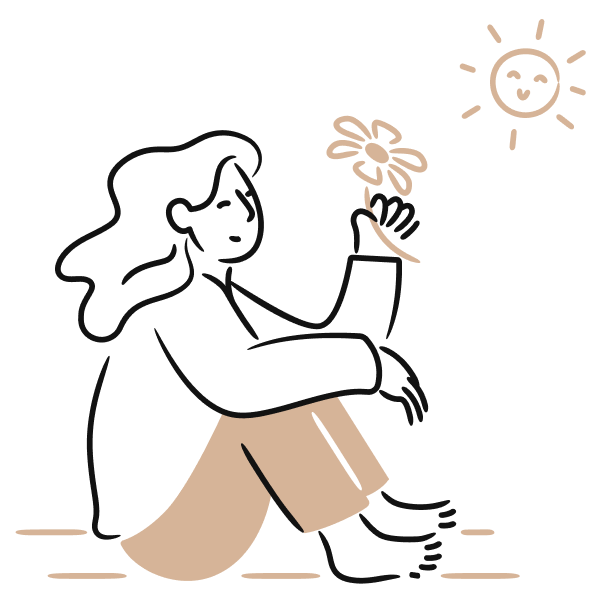There are different types of trauma and different trauma symptoms. In this article, we’ll explain the difference between one-off and ongoing or complex trauma. You’ll also find a list of symptoms associated with trauma.
What Are the Different Types of Trauma?
There are different types of trauma. These are distinct from one another because they each have different causes. The treatment that will be most suitable, partly depends on the type of trauma involved. We make a distinction between one-off, ongoing and complex trauma.
One-off trauma
If you’re experiencing one-off trauma, your trauma will have a clearly identifiable trigger. In other words, there will be an isolated moment in your past that caused your psychological pain. For example, this could be an accident or the death of a loved one.
Ongoing or complex trauma
Are you experiencing ongoing or complex trauma? This is trauma that has built up over time as a result of repeated traumatic experiences. This could be the result of persistent abuse or years of being bullied. Complex trauma causes different types of symptoms. You may end up suffering from an anxiety disorder or low self-esteem.
Complex post-traumatic stress disorder (PTSD) occurs, for example, when you’ve been the victim of early childhood trauma. Early childhood trauma means that you experienced the trauma during your childhood. For example, this could be sexual abuse, mistreatment or neglect. If you’re a frontline worker (or have worked as one in the past), you may also be suffering from complex PTSD.
When Do Symptoms First Occur After a Traumatic Event?
Just as the effects of trauma differ from person to person, it’s also true that for some people the psychological and physical symptoms of trauma show up immediately and for some they don’t. In some cases, you may suffer from feelings of anxiety and being uncomfortable in your own skin in the immediate aftermath of a distressing event. This means your symptoms have shown up straight away. There’s also the chance that this will pass after a while, once you’ve processed the event.
But it could also be the case that you don’t initially notice any symptoms after the disturbing event. The symptoms may then show up later. In fact, it could take weeks or even months for you to develop a stress disorder in response to the trauma. In some cases, it can even take years for symptoms to appear.
Acute Stress Disorder or PTSD
Did you notice your symptoms immediately or a short time after the distressing event? And did they pass after a few weeks? This is what we call acute stress disorder. Did it take longer for you to develop symptoms? And have they subsequently lasted for a long period of time? This is what we’d call post-traumatic stress, or PTSD.
What Are the Symptoms of Trauma?
The symptoms of acute stress disorder caused by trauma are pretty similar to those of post-traumatic stress. Trauma can cause different symptoms in different people.
Symptoms of Trauma (and PTSD)
- Stress: A continual feeling of irritability and stress is a common symptom of trauma.
- Symptoms of anxiety: You become anxious about fear itself. You’re afraid of a danger that’s no longer present.
- Replaying: The distressing event may keep playing over and over again in your mind.
- Nightmares: You may also find yourself reliving the event at night in the form of nightmares.
- Avoidant behavior: You might avoid the place where the traumatic event took place, or certain people related to it – as well as objects, for example. You’ll do this out of fear of being reminded of the event or feeling anxious again.
- Isolation: You may become isolated as a result of trauma.
- Losing control: You’ll feel like you’ve lost control of your life.
- Negative thoughts: You may experience feelings of depression and a lower mood.
- Always feeling alert or on edge: You feel like you’re constantly on guard. You’re ready for action at all times. It’s a state of constant anxiety as you keep looking for danger that’s no longer present. There’s usually no rational reason for this level of agitation.
- Being jumpy or quick to panic: You may experience exaggerated reactions when startled, and possibly panic attacks.
- Poor concentration: Your ability to concentrate will deteriorate.
- Dizziness: For some people, trauma also manifests as dizziness.
- Outbursts of rage: You may experience rage and anger, and find yourself behaving in ways that are really out of character for you.
If these symptoms persist for a long time and the person has developed PTSD, then further symptoms may include:
- Low self-esteem: You may have low self-confidence and a negative view of yourself as a result of trauma. You might find yourself feeling worthless. You feel like a failure or a bad person.
- Problems functioning: You won’t function as well, and this will cause problems at work, in your family and with your relationships.
- Emotional issues: You find it difficult to manage your emotions. You may find it hard to feel your emotions, as if you’ve become emotionally empty. You’ve lost control over your emotional responses.
- Use of drugs or alcohol: Some people who have experienced trauma become overly dependent on drugs or alcohol.
- Self-harm or reckless behavior: Some people may resort to self-harm. Additionally, they may turn to reckless behavior, taking unnecessary risks.
Learn more about PTSD
{
“@context”: “https://schema.org”,
“@graph”: [{
“@type”: “MedicalWebPage”,
“mainEntityOfPage”: {
“@type”: “WebPage”,
“@id”: “https://ipractice.nl/klachten/trauma/symptomps-and-types/”
},
“headline”: “Trauma: 3 Types and 13 Symptoms of a Trauma | iPractice”,
“description”: “Read about the 3 types of trauma and recognize symptoms of trauma. How do you know if you have trauma? Explained psychologists.”,
“image”: “https://ipractice.nl/wp-content/uploads/2021/10/nine-gramberg-ipractice-psycholoog.png”,
“datePublished”: “2021-06-11T15:10:41+00:00”,
“keywords”: “types of trauma, trauma types, symptoms trauma, symptoms of trauma, what are symptoms of trauma”,
“lastReviewed”: “2023-03-14T09:59:50+00:00”,
“author”: {
“@type”: “Person”,
“name”: “Simone Bosters”,
“url”: “https://www.simonebosters.nl/”,
“sameAs”: “https://nl.linkedin.com/in/simonebostersvandenbighelaar”,
“description”: “Medical copywriter, with extensive experience in medical writing for the dietary supplement industry, health websites and healthcare entrepreneurs.”
},
“reviewedBy”: {
“@type”: “Person”,
“name”: “Nine Gramberg”,
“jobTitle”: “GZ-Psychologist”,
“gender”: “https://schema.org/Female”,
“url”: “https://ipractice.com/team/psychologist/nine-gramberg/”,
“sameAs”: “https://nl.linkedin.com/in/nine-gramberg-4701b679”,
“description”: “The symptoms of a trauma are a normal reactions to an abnormal event.”,
“familyName”: “Gramberg”,
“honorificPrefix”: “Mrs”,
“honorificSuffix”: “Master”,
“nationality”: “Dutch”,
“image”: “https://ipractice.nl/wp-content/uploads/2021/10/nine-gramberg-ipractice-psycholoog.png”,
“hasOccupation”: {
“@type”: “Occupation”,
“name”: “GZ-Psychologist”,
“occupationLocation”: {
“@type”: “Country”,
“name”: “Nederland”
},
“qualifications”: [{
“@type”: “EducationalOccupationalCredential”,
“name”: “GZ-psycholoog”,
“url”: “https://www.rino.nl/big-opleidingen/gz-psycholoog-volwassenen”,
“description”: “The broad, generalist training aims to train broadly employable professionals with knowledge and skills in diagnostics, indication, psychological interventions and other professional tasks. The GZ psychologist independently treats psychological disorders, life problems and the psychological aspects associated with physical illness, disability and handicap. The short-term approach to psychological problems is also covered.”
}],
“responsibilities”: [“observing, interviewing and questioning clients”, “diagnosing dysfunction in work situations or not controlling behaviour”, “investigating and identifying behavioural or emotional patterns”, “testing clients for patterns that help to better understand and predict behaviour”, “looking at the different ways dysregulations can manifest themselves, such as anxiety or mood symptoms, addiction problems, personality disorders or getting stuck in contacts and relationships”]
},
“worksFor”: {
“@type”: “Organization”,
“name”: “iPractice”,
“url”: “https://ipractice.nl/”,
“address”: {
“@type”: “PostalAddress”,
“addressLocality”: “Amsterdam”,
“postalCode”: “1011 RN”,
“streetAddress”: “Nieuwe Herengracht 47”
}
},
“alumniOf”: [{
“@type”: “EducationalOrganization”,
“name”: “RINO”,
“url”: “https://www.rino.nl/”,
“sameAs”: “https://www.rino.nl/big-opleidingen/gz-psycholoog-volwassenen”
},
{
“@type”: “Organization”,
“name”: “OLVG”,
“url”: “https://olvg.nl/”,
“sameAs”: “https://nl.wikipedia.org/wiki/Onze_Lieve_Vrouwe_Gasthuis”
}, {
“@type”: “CollegeOrUniversity”,
“name”: “VU Amsterdam”,
“url”: “https://vu.nl/nl”,
“sameAs”: “https://nl.wikipedia.org/wiki/Vrije_Universiteit_Amsterdam”
}
]
},
“publisher”: {
“@type”: “Organization”,
“name”: “iPractice”,
“logo”: {
“@type”: “ImageObject”,
“url”: “https://ipractice.nl/wp-content/uploads/2019/12/ipracticelogo_medium-trns.png”
}
}
},
{
“@type”: “FAQPage”,
“mainEntity”: [{
“@type”: “Question”,
“name”: “What does a trauma do to you?”,
“acceptedAnswer”: {
“@type”: “Answer”,
“text”: “Many people go through a shocking experience in their lives. It is normal to experience symptoms from this. Usually, these go away overtime. If you cannot cope with a trauma properly, you may experience long-term complaints: PTSD may develop. PTSD affects your life on several levels. If you get angry or irritable more easily and are not comfortable in your own skin, it also affects your family and friends. In addition, your work can suffer. Especially because your ability to concentrate is not what it used to be. Some people with PTSD are temporarily unable to go to work or school. Alcohol problems or addictions to sedatives also occur as a result of PTSD.”
}
}, {
“@type”: “Question”,
“name”: “Can you unconsciously have trauma?”,
“acceptedAnswer”: {
“@type”: “Answer”,
“text”: “Yes. You may consciously or unconsciously shut yourself off from processing the trauma. Then you put it away and avoid thinking about your feelings and thoughts related to the trauma. Sometimes it even seems so far away that you can’t even remember it properly. But the memories are still there in your memory. You just block them out.”
}
}]
}
]
}
Help with Symptoms of Trauma
Do you identify with some of the symptoms of a person who has experienced trauma? There’s no need to carry on alone if you’re suffering from acute stress disorder or PTSD as a result of trauma. A psychologist can help you by offering expert advice and tailored treatment.
-
Do you have questions about what a trauma is or how you can treat and recover from a trauma? Call us on +31207717996 or book a consultation and we give you personal advice. Or read more about when to consult a psychologist and how to match with a psychologist.
-
At iPractice, we use blended care. This is a combination of online and offline therapy. You’ll have face-to-face conversations with a consulting psychologist and you’ll also have access to an online psychologist in between.
FAQ
Many people go through a shocking experience in their lives. It is normal to experience symptoms from this. Usually, these go away overtime. If you cannot cope with a trauma properly, you may experience long-term complaints: PTSD may develop. PTSD affects your life on several levels. If you get angry or irritable more easily and are not comfortable in your own skin, it also affects your family and friends. In addition, your work can suffer. Especially because your ability to concentrate is not what it used to be. Some people with PTSD are temporarily unable to go to work or school. Alcohol problems or addictions to sedatives also occur as a result of PTSD.
Yes. You may consciously or unconsciously shut yourself off from processing the trauma. Then you put it away and avoid thinking about your feelings and thoughts related to the trauma. Sometimes it even seems so far away that you can’t even remember it properly. But the memories are still there in your memory. You just block them out.


 Nederlands
Nederlands




